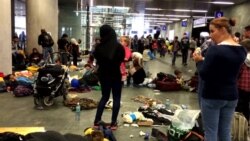European Union nations remain deeply divided on how to deal with the influx of migrants that is not showing signs of slowing down.
Hundreds of migrants remain trapped Tuesday as Hungary closed its border with Serbia, and Germany continued to implement border restrictions for the first time in decades.
After a summit of EU interior ministers failed to reach consensus in Brussels on Monday, Germany warned it could push for sanctions against EU members that refuse to accept refugee quotas.
Germany, with the EU’s highest gross domestic product and its offers to take in migrants and fund their resettlement, has been the destination of choice for thousands who have been making the long, arduous journey from places that include Syria, Iraq, and Afghanistan.
The massive influx prompted German authorities to implement border restrictions this week, diminishing but not stopping the flow of migrants coming in through the Austrian border.
Serbia says it is not able to handle the vast number of migrants gathered along the border with Hungary, after Hungarian officials closed the crossing point as part of a crackdown on the migrants.
Serbia is not a "collection center," said Serbian Foreign Minister Ivica Dacic Tuesday. He called it unacceptable for migrants to have to return to Serbia, especially as more and more arrive from Greece and Macedonia.
Hungarian Prime Minister Viktor Orban said that under new security measures that took effect Tuesday, his administration will be tough on those who cross the border illegally.
WATCH: VOA's Heather Murdock reports on the situation in Vienna, Austria
On Tuesday, hundreds passed through Munich’s central train station, which has been the main entry point for thousands for the last few weeks.
German authorities have been busing migrants or putting them on trains to points throughout the country to begin the resettlement process and allow them to apply for asylum. German police say their aim is to ensure the influx is orderly.
But German leaders say Germany should not shoulder the burden alone and this week pressed EU nations to accept obligatory quotas to receive 160,000 migrants. German Interior Minister Thomas de Maiziere on Tuesday said the European Union should put pressure on nations that refuse.
President Obama speaks out on EU migrant crisis:
At a White House meeting Tuesday with Spain's King Felipe VI, President Barack Obama said the entire world has to pitch in to help the migrants.
"We agreed that this is going to require cooperation with all the European countries and the United States and the international community in order to ensure that people are safe, that they are treated with shared humanity and that we also may have to deal with the source of the problem, which is the ongoing crisis in Syria."
Obama said he told the king it is important that the U.S. also take its share of Syrian refugees.
Border Restrictions
Like Germany, Hungary, Slovakia, and the Netherlands have also introduced border controls. Hungary sealed off its border with Serbia and is preparing to extend a razor wire fence to its border with Romania, expecting migrants would find a way to go around and cross illegally.
At the same time, Hungarian authorities began to treat undocumented migrants who cross its borders as criminal offenders and arrested scores of people by late Tuesday.
The influx and measures resulting from it have put pressure on the European Union’s principles of allowing free movement between member states and called into question the future of the Schengen agreement that guarantees that freedom of passage.
Divisions deepened Tuesday, after the warning from Germany.
Slovakia is among the EU members that oppose obligatory refugee quotas.
“We will never accept mandatory quotas for distribution of refugees,” said Slovak Prime Minister Robert Fico. The Slovak leader said a move by Germany to get sanctions imposed would mean the end of the European Union.
The Czech Republic, Poland, and Hungary also oppose mandatory quotas.
Analysts say the split between eastern and western European nations on the migrant issue is not accidental, and is rooted in modern history dating back to the Second World War.
With a need to rebuild after the war and a declining population, Germany in the 1950s allowed an influx of guest workers, many of them Muslims from Turkey. France, the Netherlands, and Britain, facing similar post-war situations, drew immigrants from their former colonies.
This conditioned western European nations to be receptive to Muslim newcomers.
“In Eastern European countries, however, migration hasn’t played such a big role - in some of these countries, less than one percent of the population are migrants,” said Matthias Kortmann, a political scientist and specialist on migration and integration studies at Ludwig Maximilian University of Munich, in a VOA interview.
“Accordingly, in these countries, there is more skepticism toward migrants,” he added.
In Germany, sensibilities on the treatment of people of different cultures are especially acute. Discussions on immigration are a sensitive matter because they raise the touchy issues of nationalism and xenophobia, and quickly draw uncomfortable comparisons to the country’s Nazi past, a history Germans want to put behind them.
In recent days, few Germans have openly criticized their government’s push to take in refugees.







